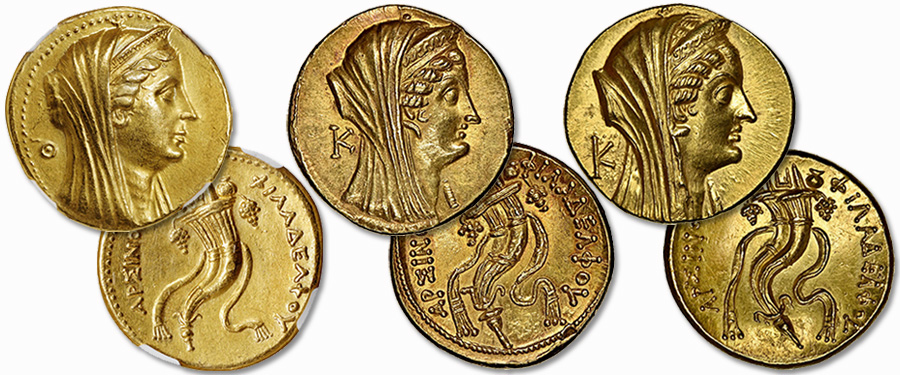
Egypt is among the oldest civilizations in human history, and the works of the ancient Egyptians, most notably the Pyramids of Giza and the Sphinx, still inspire awe and wonder. However, for nearly the entire course of Ancient Egypt’s independent reign, no coinage was produced in and for use in Egypt. The first coins issued in Ancient Egypt were gold staters during the reign of the Pharaoh Nektanebo II during the 30th Dynasty, circa 360 B.C. The 30th Dynasty was the last native-born dynasty to rule Egypt, as shortly thereafter, Egypt came under foreign rule—first Persian and later Macedonian Greek.
This later Macedonian Greek period of rule has come to be known as Ptolemaic Egypt named for the founder of the dynasty, Ptolemy I Soter (the Savior). Ptolemy was a companion of Alexander the Great and became ruler of Egypt after the death of Alexander. Under his reign coinage production ramped up in Ancient Egypt, with several issuances on the Greek Attic standard of Drachm coinage, with Tetradrachms and Oktadrachms being prominent. This "Greek" rule of Egypt lasted until 30 B.C. and the final defeat of Mark Antony and Kleopatra VII by Octavian. During this period, coinage was struck for the reign of every ruler, with male rulers adopting the regnal name Ptolemy and all female regents taking the names Kleopatra, Arsinoe, or Berenike.
Ptolemaic Egypt was culturally both Greek and Egyptian, with the rulers and upper-class speaking Koine Greek, while the native Egyptian language remained in common use. At its height, Ptolemaic Egypt was one of the wealthiest and most powerful of the Hellenistic states, though infighting and war weakened the kingdom and it gradually became more dependent on the Roman Republic. The end of Ptolemaic Egypt came after Kleopatra VII threw in her lot with Mark Antony in his civil war against Octavian. Octavian defeated Antony and became the emperor Augustus, with Egypt being relegated to a Roman province.
The three-century Ptolemaic Egyptian period provided some of the most collectible and desirable ancient coins, with gold Oktadrachms being particularly in demand. In the Stack’s Bowers Galleries January 2022 auction, three of these marvelously large sized issues are featured. Lot 3089 and Lot 4383 each offer NGC AU examples that maintain charming details and attractive golden luster, though are more affordable due to edge filing or a test cut. The crowning example of the trio is Lot 4382, graded MS with a 5/5 Strike and 4/5 Surface by NGC. This example was struck under the reign of either Ptolemy VI or Ptolemy VIII and is one of the finest surviving examples. All three bear the likeness of Arsinoe II, as it was common practice to produce posthumous issues to honor previous rulers. These ancient treasures will be offered along with numerous other examples from Ptolemaic Egypt at our upcoming NYINC auction.
The entire January 2022 NYINC auction is available for viewing and bidding at StacksBowers.com, where you can also see our upcoming auction schedule and future offerings. We are always seeking world and ancient coins, medals, and paper money for our auctions, and are currently accepting consignments for our Spring 2022 Hong Kong auction and our Collectors Choice Online (CCO) auctions. If you would like to learn more about consigning, whether a singular items or an entire collection, please contact one of our consignment directors or info@stacksbowers.com today and we will assist you in achieving the best possible return on your material.





